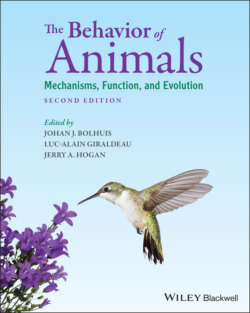Читать книгу The Behavior of Animals - Группа авторов - Страница 18
Cognitive psychology
ОглавлениеWithin experimental psychology there came a reaction to behaviorism in what we now call cognitive psychology. In contrast to behaviorism, cognitive psychologists start with the assumption that individuals (humans and other animals) have a mental life that can be investigated (Chapter 9). For instance, Skinner (1957) maintained that language development in children was a learning process, in which responses (i.e., uttering certain sounds) were reinforced. The American linguist Noam Chomsky (1959) wrote a highly critical review of Skinner’s book on language development, suggesting that language acquisition is not a case of instrumental conditioning, but a much more complex interaction between experience and internal cognitive mechanisms (Chapter 7). At birth the child is already endowed with essential knowledge of language, the theory of which is known as Universal Grammar. Clearly, learning is involved in the development of language, but it is not the only factor. Chomsky and colleagues have recently described the growth of language in the child as “the interplay of three factors: domain-specific principles of language (Universal Grammar), external experience, and properties of non-linguistic domains of cognition including general learning mechanisms and principles of efficient computation” (Yang et al. 2017). Another important publication that signaled the beginning of the cognitive revolution is a book by the British psychologist Donald Broadbent (1958) who, in contrast to Skinner, analyzed learning and memory in terms of cognitive mechanisms rather than stimulus–response relations. Hogan (1988, 2017) has noted that what cognitive psychologists call “cognitive structures” are in fact the same as the causal mechanisms that were proposed by ethologists such as Lorenz and Tinbergen (Chapters 3 and 9).
